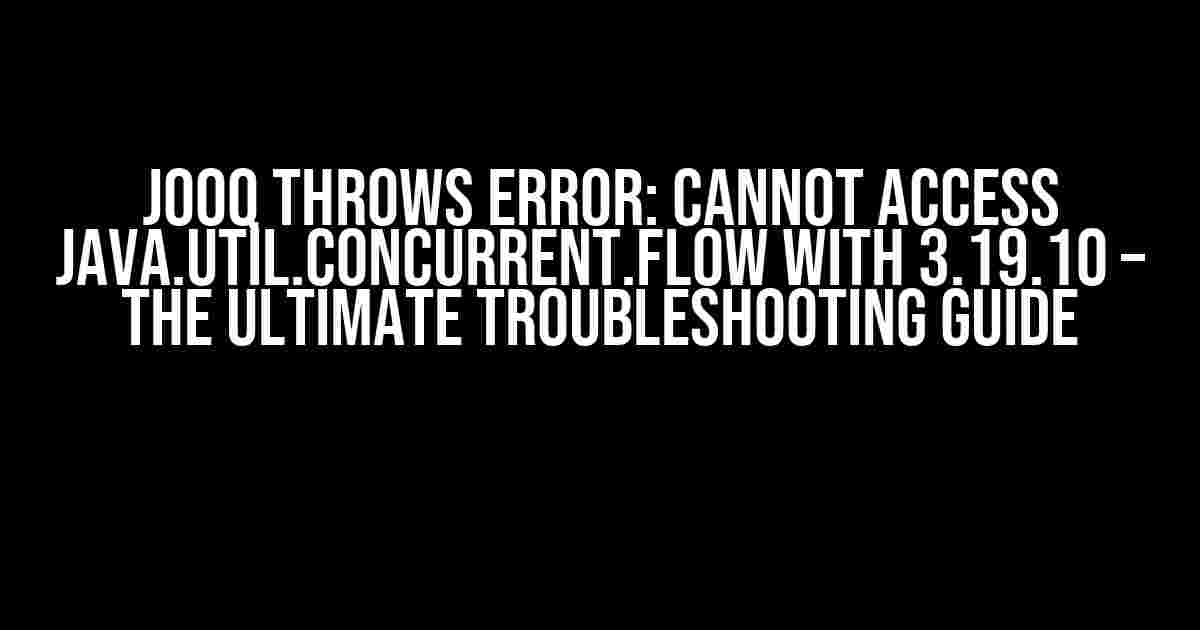Are you frustrated with the pesky error message “cannot access java.util.concurrent.Flow” when working with jOOQ 3.19.10? Well, you’re not alone! In this comprehensive guide, we’ll delve into the root causes of this error and provide you with step-by-step solutions to get your jOOQ application up and running smoothly.
What is jOOQ?
jOOQ is a popular Java library that provides a simple and intuitive way to interact with databases using Java. It’s a powerful tool that allows you to write type-safe, SQL-like queries in Java, making it a favorite among Java developers.
The Error: Cannot Access java.util.concurrent.Flow
So, what’s this error all about? The “cannot access java.util.concurrent.Flow” error typically occurs when jOOQ is unable to access the `java.util.concurrent.Flow` class, which is part of the Java Standard Library. This class is used for asynchronous programming in Java and is required by jOOQ for certain operations.
Causes of the Error
There are several reasons why jOOQ might throw this error:
- Incompatible Java version: jOOQ 3.19.10 requires Java 11 or later, which includes the `java.util.concurrent.Flow` class. If you’re using an earlier Java version, you’ll encounter this error.
- Missing or incorrect dependencies: jOOQ relies on certain dependencies to function correctly. If these dependencies are missing or incorrect, you might see this error.
- Conflicting library versions: If you’re using other libraries that have conflicting versions with jOOQ, it can cause issues like this error.
Solutions to the Error
Now that we’ve identified the potential causes, let’s dive into the solutions!
Solution 1: Upgrade to Java 11 or Later
The simplest solution is to upgrade to Java 11 or a later version. This will ensure that you have the required `java.util.concurrent.Flow` class available.
// Update your Java version in your project's build file (e.g., pom.xml for Maven)
<java.version>11</java.version>
// Or, update your Java version in your IDE's project settings
Solution 2: Check and Update Dependencies
Make sure you have the correct dependencies in your project. For jOOQ, you’ll need the following dependencies:
// Maven dependencies
<dependency>
<groupId>org.jooq</groupId>
<artifactId>jooq</artifactId>
<version>3.19.10</version>
</dependency>
<dependency>
<groupId>javax.xml.bind</groupId>
<artifactId>jaxb-api</artifactId>
<version>2.3.1</version>
</dependency>
// Gradle dependencies
dependencies {
implementation 'org.jooq:jooq:3.19.10'
implementation 'javax.xml.bind:jaxb-api:2.3.1'
}
Solution 3: Resolve Conflicting Library Versions
If you’re using other libraries that have conflicting versions with jOOQ, try resolving these conflicts by updating or excluding the conflicting libraries.
| Library | Conflicting Version | Solution |
|---|---|---|
| Hibernate | 5.4.20.Final | Exclude Hibernate’s Java Flow dependency: |
Additional Troubleshooting Tips
If the above solutions don’t work, try these additional troubleshooting tips:
- Check your project’s classpath for any duplicate or conflicting libraries.
- Verify that you’re using the correct jOOQ version and configuration.
- Review your code for any syntax errors or inconsistencies.
- Check the jOOQ documentation and release notes for any known issues or limitations.
Conclusion
In conclusion, the “cannot access java.util.concurrent.Flow” error with jOOQ 3.19.10 can be resolved by identifying and addressing the underlying causes. By upgrading to Java 11 or later, checking and updating dependencies, and resolving conflicting library versions, you should be able to get your jOOQ application up and running smoothly. Remember to stay vigilant and troubleshoot any additional issues that may arise.
Happy coding, and don’t let errors hold you back!
Frequently Asked Question
jOOQ throwing errors can be frustrating, especially when it’s related to something as fundamental as Java’s concurrent API. Let’s dive into the most frequently asked questions about “jOOQ throws error cannot access java.util.concurrent.Flow with 3.19.10” and get your application back on track!
What is the main reason behind jOOQ throwing “cannot access java.util.concurrent.Flow” error with version 3.19.10?
The primary reason behind this error is due to the incompatibility between jOOQ 3.19.10 and Java 8. The `java.util.concurrent.Flow` class was introduced in Java 9, and since jOOQ 3.19.10 doesn’t support Java 9+, it throws this error.
Is there a way to make jOOQ 3.19.10 work with Java 8?
Yes, you can make jOOQ 3.19.10 work with Java 8 by adding the “jakarta.ws.rs:jakarta.ws.rs-api:3.0.1” dependency to your project. This dependency provides a Java 8-compatible implementation of the `java.util.concurrent.Flow` class.
What are the alternative jOOQ versions that support Java 8?
jOOQ versions 3.14.x, 3.15.x, and 3.16.x are compatible with Java 8. You can downgrade to any of these versions to resolve the “cannot access java.util.concurrent.Flow” error.
Will upgrading to a newer jOOQ version resolve the issue?
Yes, upgrading to jOOQ 3.20.x or later versions will resolve the “cannot access java.util.concurrent.Flow” error. These versions are designed to work with Java 8 and later.
Are there any other potential issues to be aware of when using jOOQ with Java 8?
Yes, when using jOOQ with Java 8, you might encounter issues related to the Java Module System, as jOOQ 3.19.10 and later versions are designed to work with the Java Module System. Make sure to configure your project accordingly to avoid any potential issues.
